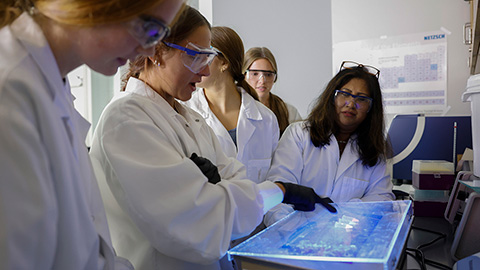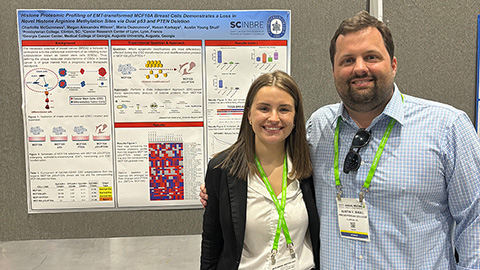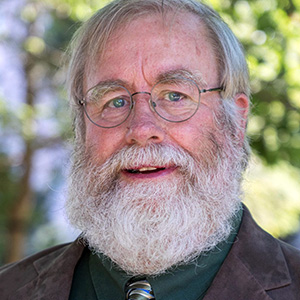An open letter to the ASBMB executive director search committee
As the American Society for Biochemistry and Molecular Biology seeks to hire a new executive director by the end of this year, I’m writing today to share my thoughts on the process.
I have been an ASBMB member since 1986. Since 2007, I have continually served the society in a variety of roles. I have chaired the Education and Professional Development Committee and, later, the Membership Committee. I served on the Journal of Biological Chemistry editorial board from 2010 to 2015. I worked on the accreditation program and with members of the Maximizing Access Committee (then the Minority Affairs Committee) on Hands-on Opportunities to Promote Engagement in Sciences, or HOPES, a National Science Foundation–funded K–12 science outreach program. I have had the pleasure of working closely with both Barbara Gordon and Steve Miller. As a faculty member and former department head, I have extensive experience with a wide range of leadership styles.
I care deeply about the ASBMB. Having chaired or sat on many university search committees looking to fill administrative positions, I am all too familiar with the inevitable assertion, generally from an administrator, that executive experience is the indispensable qualification by which to judge applicants — that, first and foremost, we need someone who is a master of the spreadsheet.
I beg to disagree.
As you know, our society is at a crossroads. The steady revenue stream provided by subscriptions to our journals has evaporated with the decision to move to open access. In my opinion, there is no viable steady-state model for ASBMB. We cannot go on as we are. Either we will become THE society of biochemistry and molecular biology writ large, or we will slowly fade away.
The times demand an executive director who possesses a big-picture vision, an appreciation for the breadth and diversity of our society, an ability to connect with the many members whose volunteerism makes possible so much of what the ASBMB is and does, and the boldness to dare.
As you sift through the applications, especially each applicant's vision statement and external letters of recommendation, look for signs of altruism, vision and an investment mentality rather than the extent of administrative experience and managerial acumen. For example, does a candidate effortlessly credit others, writing or speaking in terms of teams, communities and groups, or do they constantly talk in terms of me, my and I? Do they think and act incrementally or in transformative terms? Do they acknowledge their shortcomings while exhibiting a steady internal compass? Don't be afraid to embrace someone with the "right stuff," even though they may seem relatively young and inexperienced.
Speaking as a former department head and committee chair, I believe that administrative experience is overrated. Administrative skills can be learned, and lack of experience can be addressed through effective partnership with staff. Imagination, vision, empathy and conviction cannot acquired from a book or a workshop.
We need to be willing to dare if the ASBMB is to grow and diversify. And that’s what it must do to match the global impact of our discipline and the needs of our members, both present and future.
Enjoy reading ASBMB Today?
Become a member to receive the print edition four times a year and the digital edition monthly.
Learn moreGet the latest from ASBMB Today
Enter your email address, and we’ll send you a weekly email with recent articles, interviews and more.
Latest in Opinions
Opinions highlights or most popular articles

The tortoise wins: How slowing down saved my Ph.D.
Graduate student Amy Bounds reflects on how slowing down in the lab not only improved her relationship with work but also made her a more productive scientist.

How pediatric cataracts shaped my scientific journey
Undergraduate student Grace Jones shares how she transformed her childhood cataract diagnosis into a scientific purpose. She explores how biochemistry can bring a clearer vision to others, and how personal history can shape discovery.

Debugging my code and teaching with ChatGPT
AI tools like ChatGPT have changed the way an assistant professor teaches and does research. But, he asserts that real growth still comes from struggle, and educators must help students use AI wisely — as scaffolds, not shortcuts.

AI in the lab: The power of smarter questions
An assistant professor discusses AI's evolution from a buzzword to a trusted research partner. It helps streamline reviews, troubleshoot code, save time and spark ideas, but its success relies on combining AI with expertise and critical thinking.

How AlphaFold transformed my classroom into a research lab
A high school science teacher reflects on how AI-integrated technologies help her students ponder realistic research questions with hands-on learning.

Writing with AI turns chaos into clarity
Associate professor shares how generative AI, used as a creative whiteboard, helps scientists refine ideas, structure complexity and sharpen clarity — transforming the messy process of discovery into compelling science writing.

